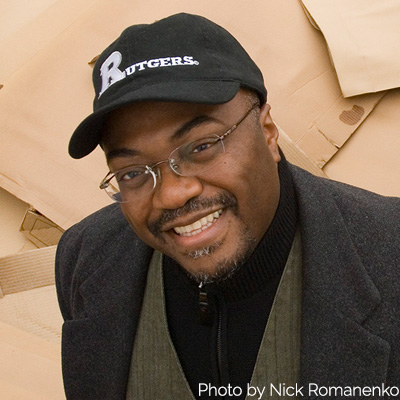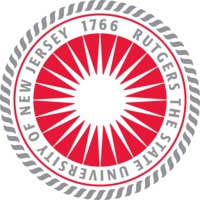Empowering environmental design and development of products that reduce, reuse, and recycle
Climate change and impact are critical in today's global society, but may seem too big of a problem for people other than environmentalists and researchers to know where and how to take action. Dr. Kevin Lyons, Associate Professor of Rutgers Business School and Supply Chain Management at Rutgers University, therefore brings climate research down to the individual level to help the public understand their role on the environment. Specializing in Supply Chain Archaeology which studies the entire life of a product from its creation to consumption and its contribution to climate change, Dr. Lyons hopes to use his analyses to develop a climate impact label for each product, similar to a nutrition chart. By seeing the climate and ecological impact assessments indicated on the everyday product spanning the entire spectrum from shampoo and healthcare items to automobiles and buildings, consumers can start relating to the bigger problem, and be empowered to influence and to take part in the solution.
Dr. Kevin Lyons, an influential pioneer of a global applied research initiative to explore product, commodity, energy, and waste development and design since 1980, is the founding director of Purchasing Green, who was responsible for “greening” Rutgers University as the model institution for sustainable development where leadership, faculty, staff, students, policies, and economic resources have seen significant change by participating in the supply chain and procurement practices. A military veteran himself, Dr. Lyons also works with returning veterans in the development of sustainable programs at military installations, creating career opportunities and collaborating with the military to convert switchgrass into a renewable resource. A true environmental and also economical investigator, Dr. Lyons spends much of his time in the landfills, in order to communicate the raw situation via smartphone apps in simple and easy language, and works with small urban manufacturers to propel economic development.
Current projects include:
- Greening the Supply Chain: By following materials from the time they are designed to the time they reach consumers’ hands, Dr. Lyons examines the environmental quality of a holistic spectrum of products. He believes that all products and materials should have a climate and ecological impact assessment attached to them in order for us to properly design and able products based on their climate impacts. To this end, Dr. Lyons not only researches what is happening in the design process of a product, but also investigates consumer behavior and the acceptance rate to ensure that the price will not be elevated while energy and waste cost suffered to make the product are reduced.
- Product Climate Profile: How does the product relate to the climate? Dr. Lyons runs life cycle analyses of different products, which involve comprehensive itemization of all the materials, chemicals, as well as the energy used to create the product. Such comprehensive assessment of the material and the material’s impact on the climate will enable a top-to-bottom analysis of a product, which will then be printed and designed as a label for the public to consider when purchasing.
- Supply Chain Archaeology and Robotics: What happens to our product and materials when we decide we no longer want them? Although the term “archaeology” is often used for studying prehistoric artifacts that date back thousands of years, products have an instantaneous archaeological profile the moment they are created. Therefore, Dr. Lyons engages in real-time archaeology and spends much of his time in the landfills in order to communicate the raw consequences of unwanted waste. To help his students and the public visualize this situation more clearly, Dr. Lyons is working on the development and deployment of wifi enabled robots that can move, pick up, and analyze materials. Strategically placed at landfills, these robots will enable people to see what the robots see in the field and allow researchers to conduct research from a desktop computer.
- Alternative Solution: Dr. Lyons is passionate about the idea of returning materials back to their original state. However, in case this is not possible, Dr. Lyons has been exploring the possibility of using these materials to create renewable energy sources, and create something positive from what would otherwise be waste.

Bio
Dr. Kevin Lyons has been in the greening the supply chain business since 1980 when he joined the military. A young environmentalist throughout high school whose parents went through the 1970’s as environmentalist and resource efficiency master's, phrases like “our budget is tight (with six children),” “we buy what we need,” “nothing is wasted,” and “minimize our waste” had deeply influenced him. After high school, fresh off the lessons of living an environmentally-friendly life, he enlisted in the United States Air Force, where he was able to understand that the impacts of badly designed, manufactured, and transported products could have economic, environmental and social impacts throughout the entire supply chain, especially when these items make their way into a major military installation. It was clear to him that the military needed fresh environmental lessons from his hometown in Reynoldsburg, OH, and he was going to be that change-agent!
Dr. Lyons’ first military assignment after basic military training at Lackland Air Force Base in San Antonio, Texas and technical schooling at Keesler Air Force Base in Biloxi, Mississippi was at F.E. Warren Air Force Base in Cheyenne, WY, where he was assigned to the Procurement and Contracting Division. Here, he witnessed the excess of waste and environmental impacts based on our procurement activity, and tried to influence this highly regulated procurement environment as best as he could by challenging suppliers and the using departments on the need to reduce their oversights. As a result, he received the ‘Buck Stops Here’ award for this environmental work and a prestigious special duty assignment to Air Force ROTC Detachment 485 at Rutgers, The State University of New Jersey -- a three year military assignment on a university campus.
After six years of military service, Dr. Lyons was honorably discharged and spent two years in healthcare procurement at St. Peter’s Medical Center in New Brunswick, New Jersey. Healthcare supply chain and procurement activity also involved a significant amount of environmentally harmful impacts due to the supplies, equipment and disposal of the waste (traditional, medical and hazardous) related to the activities of a major research hospital. In this environment where life, health, well-being, recovery, and efficacy are the prime objective, procurement of the right supplies, materials and equipment to support this mission was of prime concern and environmental issues were put on the backburner. However, as a professional purchaser Dr. Lyons controlled the contract that dictated the relationship between the hospital and the hundreds of suppliers providing supplies, materials and equipment to this institution. In his short two years at St. Peter’s, he was able to provide an economically and environmentally responsible purchasing environment that complimented the growth and prestige of the hospital, as the medical departments, laboratories, emergency and operating rooms, dining and facilities service divisions were all on board.
He left the hospital in good shape having established valuable relationships, and remarks that “If you are greening your part of the supply chain, the relationships you establish along the way are just as valuable as your efforts to save the planet!” In fact, two very valuable colleagues whom he befriended at St. Peter’s became close environmental collaborators at his next and current organization to “green” Rutgers. Rutgers, an institution with close to 900 buildings, 65,000 students, 9,000 full and part-time faculty, 15,000 full and part-time staff, sitting in three major cities, with research facilities in all 21 counties of New Jersey covering over 6200 acres, became his next and most significant introduction to greening the supply chain.
Dr. Lyons has been at Rutgers University since 1988 and the changes in leadership, faculty, staff, students, policies, and economic resources have been significant. Dr. Lyons’ quest to ‘green’ this institution has been unique but rewarding, and his ongoing passion is for the University to serve as a model institution for sustainable development by contributing to green supply chain practice and research.
For more information, visit http://greenpurchasing.rutgers.edu

In the News
Rutgers
National Association of College and University Business Officers
Publications
Awards
New Jersey State Governor’s Jefferson Awards, 2015
PSEG® Environmental Stewardship


